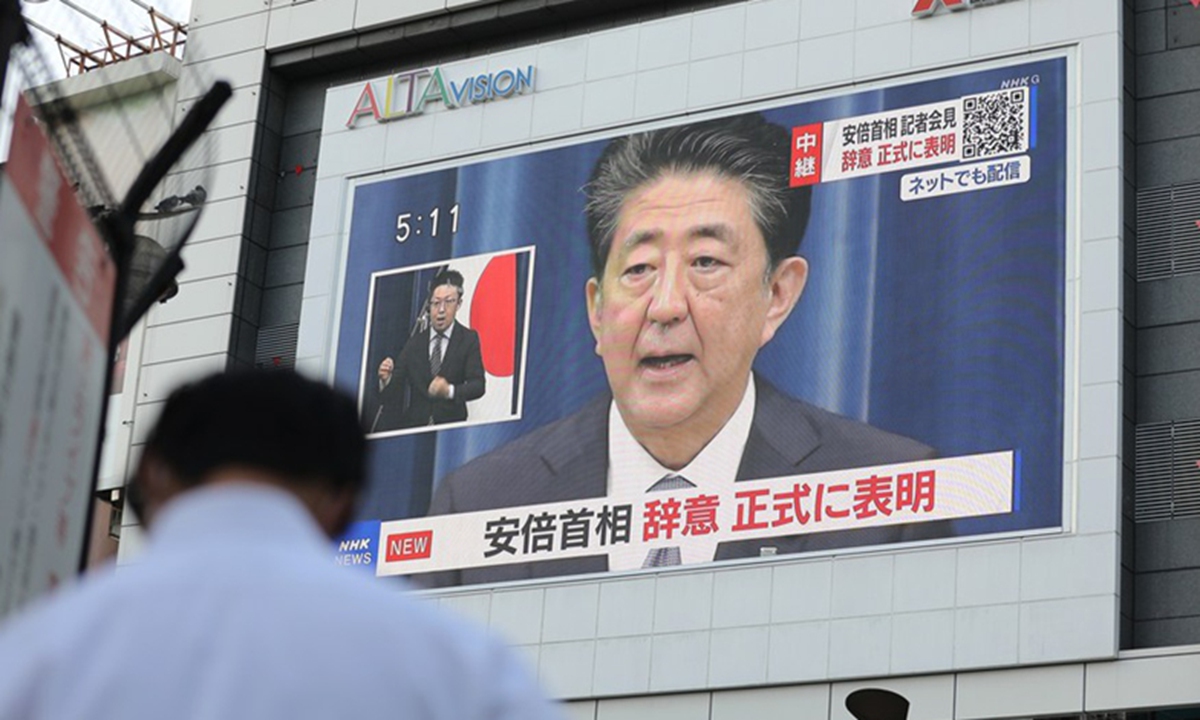China-Japan relations 'may go backward' due to US impact
By Yang Sheng Source: Global Times Published: 2020/8/30 20:43:40
Abe's successor should continue fixing bilateral ties, avoid ruining hard-won legacy

An electronic screen shows that Japanese Prime Minister Shinzo Abe speaks at a press conference in Tokyo, Japan, on Friday. Photo: Xinhua
In the wake of Japanese Prime Minister Shinzo Abe announcing his resignation, observers on both sides worry that China-Japan ties will worsen and the hard-won diplomatic achievements of recent years will vanish - and the latest interaction between Japan and the US on defense affairs is increasing those concerns.
Chinese analysts have warned that China-Japan ties could see serious setback if Abe's successor makes unwise decisions.
Japan's Defense Minister Taro Kono and his US counterpart agreed in Guam on Saturday that they will "keep China's maritime assertiveness in the South and East China seas in check," Japanese media outlet Kyodo News reported on Sunday.
"As for the South and East China seas, we confirmed that Japan and the US will strongly oppose countries unilaterally changing the status quo by force," Kono said after meeting with Mark Esper at Andersen Air Force Base, according to Kyodo News.
At a press conference on Saturday, Kono said Esper had confirmed that the US-Japan security treaty covered China's Diaoyu Islands, which Japan has illegally claimed sovereignty over, calling them the "Senkaku Islands"
"The promise made by the US to cover the Diaoyu Islands in the treaty was made in the Obama era, so the reconfirmation by Esper is nothing new and useless in changing the fact that the Diaoyu Islands belong to China," Lü Yaodong, director of the Chinese Academy of Social Sciences' Institute of Japanese Studies, told the Global Times on Sunday.
But the hostile remarks made by Kono and Esper against China's sovereignty in the region would bring uncertainty to the West Pacific, Lü said."
Kono's stance toward China is getting more hawkish and this is actually serving the US' strategic purpose rather than Japan's interests, and to what extent Abe's successor would be affected or hijacked by such a stance remains a question.
It is hoped that Japanese politicians could treasure the hard-won recovery of China-Japan ties, instead of being used by the US and risking Japan's own interests to provoke China, analysts said.
Unfortunately, under pressure from the US and domestic conservative forces, the next Japanese prime minister might even join the US-led Five Eyes Alliance and become the sixth eye carrying out surveillance of China for Washington, said Da Zhigang, director and research fellow of the Institute of Northeast Asian Studies at the Heilongjiang Provincial Academy of Social Sciences and chief expert at the Northeast Asian Strategic Studies Institute.
Pentagon officials said China fired four ballistic missiles into the South China Sea on Wednesday in an apparent warning to US reconnaissance planes flying near areas where China has been conducting naval drills, Kyodo reported. The relevant Chinese departments and military authority are yet to confirm the news.
When the US tries to provoke China and create tension in the region, Japan and other third parties should not add more uncertainty and make the situation more complicated and dangerous, said an expert at a Beijing-based military academy, who asked not to be identified, told the Global Times on Sunday.
"The US understands that it's unable to challenge China in the West Pacific on its own, so it is trying to make everyone in its alliance to join the game to contain China. The US wants to see friction and even conflicts between its allies and China, rather than the US having conflicts with China directly, so that its allies will bear the risk and US troops don't need to die," he said.
The US plans high-level talks with "Quad" security partners from India, Australia and Japan in September and October, US President Donald Trump's national security adviser said on Friday, while criticizing "very aggressive" behavior by China, the Japan Times reported.
US National Security Advisor Robert Robert O'Brien told the Atlantic Council think tank he would likely meet his opposite numbers from those countries in the US state of Hawaii in October, while Secretary of State Mike Pompeo would meet his counterparts from the so-called Quad in September and October.
"Who is being aggressive in the region and creating tensions while China is making efforts to solve disputes with its neighbors through negotiations? The answer is clear - the US. We hope these countries can at least safeguard regional peace and stability," and not be used by the US to have unnecessary conflicts with China, Lü said.
On Saturday, Kono said he and Esper also agreed during their first direct talks since January to cooperate toward the establishment of a new missile defense system after Tokyo decided in June to halt plans to deploy the US-developed Aegis Ashore missile defense system, according to Kyodo News.
"We agreed on how Japan and the US could enhance our cooperation on integrated air and missile defense, as well as ISR (intelligence, surveillance and reconnaissance) capability," Kono said.
The military expert said the missile defense system is not as dangerous as the deployment of US mid-range ballistic missiles in Japan, because that would be a direct threat to China's national security. If Japanese decision-makers submitted to US pressure to deploy not only the missile defense system but also the mid-range missiles, "they will make Japan a target of China's ballistic missiles if the US launches an attack against China in the future."
RELATED ARTICLES:
Posted in: SOCIETY